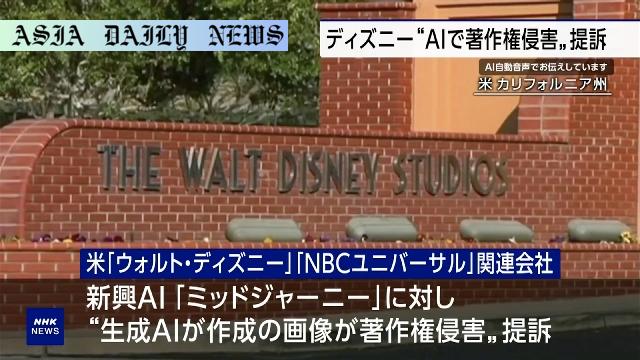Copyright: US entertainment giant Walt Disney and other studios have sued AI startup Midjourney for alleged copyright violations.
Disney and other studios filed a lawsuit accusing AI startup Midjourney of copyright violations.
The lawsuit centers on alleged generative AI’s use of content resembling Disney characters without permission.
Plaintiffs aim to prohibit the creation and distribution of such AI-generated images.
The case sets a precedent as Hollywood’s first major legal battle against AI-related copyright infringement.

The First Major Legal Showdown Between Hollywood and AI
In a groundbreaking legal development, Walt Disney and other major Hollywood studios have filed a lawsuit against AI startup Midjourney. These studios claim that the company violated their copyrights by offering generative AI services that created images resembling copyrighted characters and content from iconic franchises such as Star Wars. This case represents the first time major entertainment companies have initiated legal action addressing the intersection of AI technology and intellectual property.
The lawsuit, submitted to a federal district court in California, accuses Midjourney of creating unauthorized imagery derived from existing intellectual property. These AI-generated images reportedly include visual similarities to notable Disney characters and franchise design elements. This has raised significant concerns about the implications of generative AI’s reliance on existing media for its outputs and how those outputs align – or conflict – with intellectual property law.
The Allegations and Legal Demands
Disney, alongside NBCUniversal and other entities, has accused Midjourney of being “the quintessential copyright free-rider and a bottomless pit of plagiarism.” The plaintiffs argue that the company’s actions circumvent existing intellectual property protections. This legal response follows Midjourney’s alleged lack of cooperation with requests to adjust its practices or adopt practices that comply with copyright law. To prevent further infringement, the plaintiffs are urging the court to implement an injunction. This would stop Midjourney not only from generating but also from distributing AI-produced images that breach existing copyright agreements.
Legal and Ethical Implications
This lawsuit represents a turning point for both the entertainment and technological sectors. Generative AI, while celebrated for its creativity, has faced scrutiny for its methods. AI systems like those developed by Midjourney rely on vast datasets, often derived from copyrighted works. Developers of AI tools frequently claim their methods fall under “fair use,” but the boundaries of that claim remain unclear in increasingly commercial settings. With high stakes involved, industry experts anticipate this case will serve as a crucial precedent, potentially reshaping how AI technology is developed and regulated in creative industries.
The Future of AI and Copyright
As the legal battle unfolds, attention will undoubtedly focus on its broader ramifications. Beyond the courtroom, this case could help define the parameters of ethical AI usage, particularly in creative fields. A judgment in Disney’s favor might encourage tighter restrictions, significantly influencing how companies use copyrighted works as inputs for AI systems. Conversely, a ruling in favor of Midjourney could embolden other startups, but it may also prompt calls for stronger copyright legislation to address technological advancements.
The entertainment industry, which has historically driven innovation, now finds itself grappling with complex issues introduced by advancements like generative AI. As society reconciles creativity with technology, lawsuits such as this one may help shape a more defined and equitable balance between technological progress and intellectual property preservation.
Commentary
Implications of Copyright Violations in the Age of AI
The ongoing lawsuit filed by Disney and other prominent studios against AI startup Midjourney underscores the challenges posed by emerging technologies in our legal and creative ecosystems. At its core, this legal battle reflects a significant question: what constitutes fair use in the context of AI-generated content? The decision made in this case has the potential to set a far-reaching precedent, affecting not only media and entertainment but also countless industries leveraging generative AI.
Generative AI, though revolutionary, is a double-edged sword. On one hand, it empowers creativity by generating stunning visuals and innovative concepts that may have otherwise taken hours to produce. On the other hand, it blurs the boundaries between inspiration and infringement. Midjourney’s alleged use of copyrighted Disney characters has brought this issue to the forefront, highlighting the urgent need to establish clear legal and ethical guidelines for deploying AI. This lawsuit could provide the foundation for those much-needed regulations.
Balancing Technology with Intellectual Property Rights
The entertainment industry, in particular, has long been vigilant in protecting its intellectual property. Franchises like Star Wars are not only creative masterpieces but also enormous revenue generators. Any perceived threat to the ownership of such assets understandably becomes a matter of significant concern for companies like Disney. The lawsuit against Midjourney could be seen as a defensive move from Hollywood against unchecked technological advancements that might otherwise dilute or exploit their creations without consent.
What remains to be seen is whether this legal action will lead to collaboration or confrontation between tech and entertainment giants. A cooperative approach could involve creating AI tools designed with licensed datasets, ensuring all parties involved benefit. However, a confrontational outcome might result in stricter regulations, potentially stifling innovation within the AI sector.
A Pivotal Moment in Technological Ethics
In many ways, this legal battle is a microcosm of the broader ethical dilemmas posed by rapidly advancing technology. Just as society has had to adapt to previous technological revolutions, we must now navigate through the intricacies of AI’s capabilities versus its liabilities. The outcome of this lawsuit will do more than just resolve a dispute between Disney and Midjourney; it will likely influence the future trajectory of AI research, usage, and legislation.


